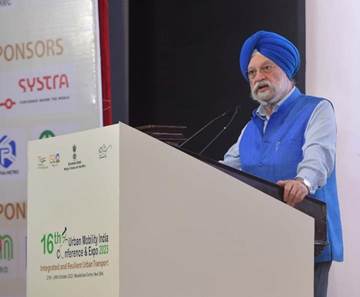Approach of government to Urban Transport witnesses significant change after 2014: Union Minister Hardeep S Puri
Minister of Housing & Urban Affairs and Petroleum & Natural Gas, Shri Hardeep Singh Puri, said that the approach of government towards issues pertaining to Urban Transport has witnessed a significant change after 2014. The rapid Urbanisation has been embraced as an opportunity rather than a challlenge during this period, he said.

The Minister was speaking at the inaugural session of 16th Urban Mobility India (UMI) Conference cum Expo 2023 here today. Shri Pradeep Singh Kharola, Chairman and Managing Director, India Trade Promotion Organisation, Shri Manoj Joshi, Secretary, Ministry of Housing & Urban Affairs (MoHUA), and Shri Vikas Kumar, Managing Director, Delhi Metro Rail Corporation Ltd. were also present at the event.
During the event, Shri Hardeep Singh Puri shared his thoughts on the major transformation that country has gone through in the field of rail-based rapid transit systems. Speaking about the metro rail’s journey in India, he said that the pace of growth of metro network in the country has seen unprecedented increase in recent years. In 2014, only 248 kms of metro rail was operational in India. Merely in 9 years, 895 kms of metro lines are operational in 20 different cities today, he said.
The Minister said that at present, India’s metro network is the 3rd largest in the world. In the next 2 to 3 years our metro network will surpass the operational length of the USA metro network, and become the 2nd largest metro network in the world, he added.
Shri Puri said that the metro network has brought comfort, stability and security to the lives of our citizens. “I am happy to note that the metro network has a daily ridership of around 1 crore”, he said. He said that the ridership number is going to increase with ease of last mile connectivity, and other factors.
The Minister also noted the importance of Regional Rapid Transit System (RRTS) and Vande Bharat Trains in the regional and inter-city connectivity.
Highlighting the efforts of Government of India to overhaul Urban Transport in the country, the Minister said that a beginning in this direction has been made through initiatives such as FAME- I, FAME-II and PM-eBus Seva Scheme. He said that PM-e-bus Sewa scheme will augment city bus operations; while giving priority to cities that lack organised bus services. Adding further, he said that 10,000 e-Buses will be deployed on a PPP model in 169 cities alongside support for associated infrastructure, bus depot and behind the meter power infrastructure. The scheme also envisages environment-friendly initiatives like bus priority infrastructure, multimodal interchange facilities, National Common Mobility Card (NCMC) based Automatic Fare Collection System (AFCS), Charging infrastructure, etc. under Green Urban Mobility Initiatives (GUMI).
Sharing his thoughts on the development of sustainable Urban Transport, Shri Puri highlighted that besides promoting Green Mobility through e-vehilces, the focus has also been placed on biofuel blending, clean energy alternatives -biogas, Green Hydrogen etc.
16th Urban Mobility India (UMI) Conference cum Expo 2023
The 16th UMI Conference & Exhibition 2023 is being organized by the Ministry of Housing and Urban Affairs through the Institute of Urban Transport (India) and with the support of Delhi Metro Rail Corporation Ltd. from 27th – 29th October, 2023 at the Manekshaw Centre, Parade Road, Delhi Cantt., New Delhi. The Conference was inaugurated today by the Union Minister of Housing and Urban Affairs, Shri Hardeep Singh Puri in the presence of other dignitaries and delegates. Senior officers from Central and State Governments, policy makers, Managing Directors of Metro Rail Companies, Chief Executives of transport undertakings, International experts, professionals, academicians and students are also participating in this event.
This year, the Conference is focusig on the theme of “Integrated and Resilient Urban Transport”. It will emphasize on designing and implementation of efficient, high quality, integrated and resilient Urban Transport systems in the cities. Rapid climate change and its impact on city transport system calls for integrated and resilient transport system to meet the mobility needs of public. The innovations have led to a wide range of transport options to emerge, thereby widening the choice available to commuters. The need of the hour is to strengthen the resilience of transport systems right from the planning stage.

